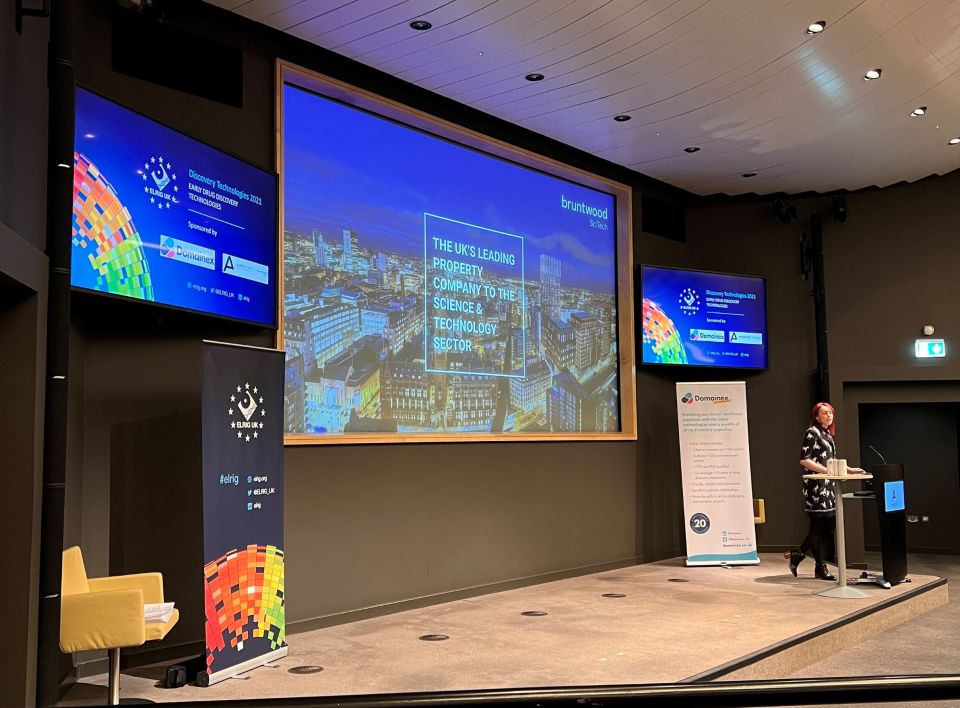3 Technologies Leading The Way In Targeted Cancer Treatments
By Bruntwood SciTech

This week, we welcomed the European Laboratory Research & Innovation Group (ELRIG) to Alderley Park for its annual Discovery Technologies Conference.
As a leading European not-for-profit organisation built to provide leading scientific content to the life science community, the conference marks the rapid advancement of new technologies in the life science sector; specifically to develop life-changing therapeutic interventions.
Day one of the conference on Tuesday 9th November had a strong focus on emerging techniques and strategies to target specific cancers. There have been huge advancements in the prevention, diagnosis and treatment of cancer; however, the conference addressed how traditional approaches and technologies could be improved as our knowledge of the human proteome and disease mechanisms evolve.
A number of life science businesses and experts from the sector presented how they are applying innovative thinking with emerging technologies to identify and utilise new target classes and drug modalities. As a result, they’re driving more possible treatments for cancer.
The following examples were three of many discovery strategies shared across the event:
1. Advances in Phenomics Drug Discovery
Professor Neil Carragher forms part of the Edinburgh Drug Discovery group, a team championing advanced technology platforms and disease models to drive oncology drug discovery and development, with a strong focus on image-based phenotypic screening.
Esophageal cancer incidence is increasing with poor outcomes for many patients. Neil and his team have combined high content screening and pathway profiling technologies with multiparametric data analysis tools to create an Esophageal adenocarcinoma (EAC) phenotypic screening platform that can identify existing pharmacologic classes and novel compounds specific to EAC cell phenotypes.
2. Fragment-based screening & chemical proteomics
Fragment-based drug discovery (FBDD) is a highly advantageous approach in target-based drug discovery and can be carried out through different biophysical and computer-based methods. It allows for reduced attrition and increased generation of leads for previously intractable biological targets.
Stephanie Constantinou and Aarti Kawatkar from AstraZeneca have combined the method with chemical proteomics - an evolving area of chemical biology using novel probes that can be used to identify the protein binding partners or targets of small molecules in live cells.
3. G-quadruplex ligands as potential anticancer drugs
G-quadruplex structures are DNA structures that have been proven to trigger DNA damage, genome instability and cell death. As such, they have brought optimism to many researchers bidding to find an antitumor strategy.
Stephen Neidle from the UCL School of Pharmacy shared how the structures have become targets for small-molecule drugs. From this research, experts have discovered that G-quadruplex ligands are able to simultaneously affect some key driver genes in human cancer; which proves to be promising in the search for effective targeted treatments.
Drug discovery at Alderley Park
Home to over 200 companies working in the life science sector, Alderley Park is a fitting host venue for ELRIG. Alongside being the home of the Cancer Research UK Manchester Institute, there is a thriving drug discovery cluster with a growing focus on oncology.
BiVictriX, who are located at Alderley Park, aims to produce a new class of biospecific therapeutics that have superior cancer selectivity. Tiffany Thorne, CEO, BiVictriX comments: “We’re the first company to use biospecifics in this concept - globally, so we differentiate ourselves in the fact that our biospecifics target two independent tumour antigens that are selectively coexpressed on the cancer cells, but are absent from healthy cells, and therefore we can reduce the side effect profile of cancer therapeutics.”
Other businesses working within the oncology space at Alderley Park include Athenex, Sygnature Discovery, Aptus Clinical and Zenzium - to name a few.
In 2020 we teamed up with some of the biggest names in UK cancer research and clinical excellence along with four major global pharmaceutical and healthcare companies to combine forces and help accelerate the translation of emerging cancer research into patient benefits. The Alderley Park Oncology Development Programme is working with companies and academic researchers across the UK to help them develop their innovations more quickly and efficiently, ready to take on new funding or collaborators to accelerate the progress of their innovations commercially.
To find out more about joining the Alderley Park ecosystem and how Bruntwood SciTech can support your life science business click here.